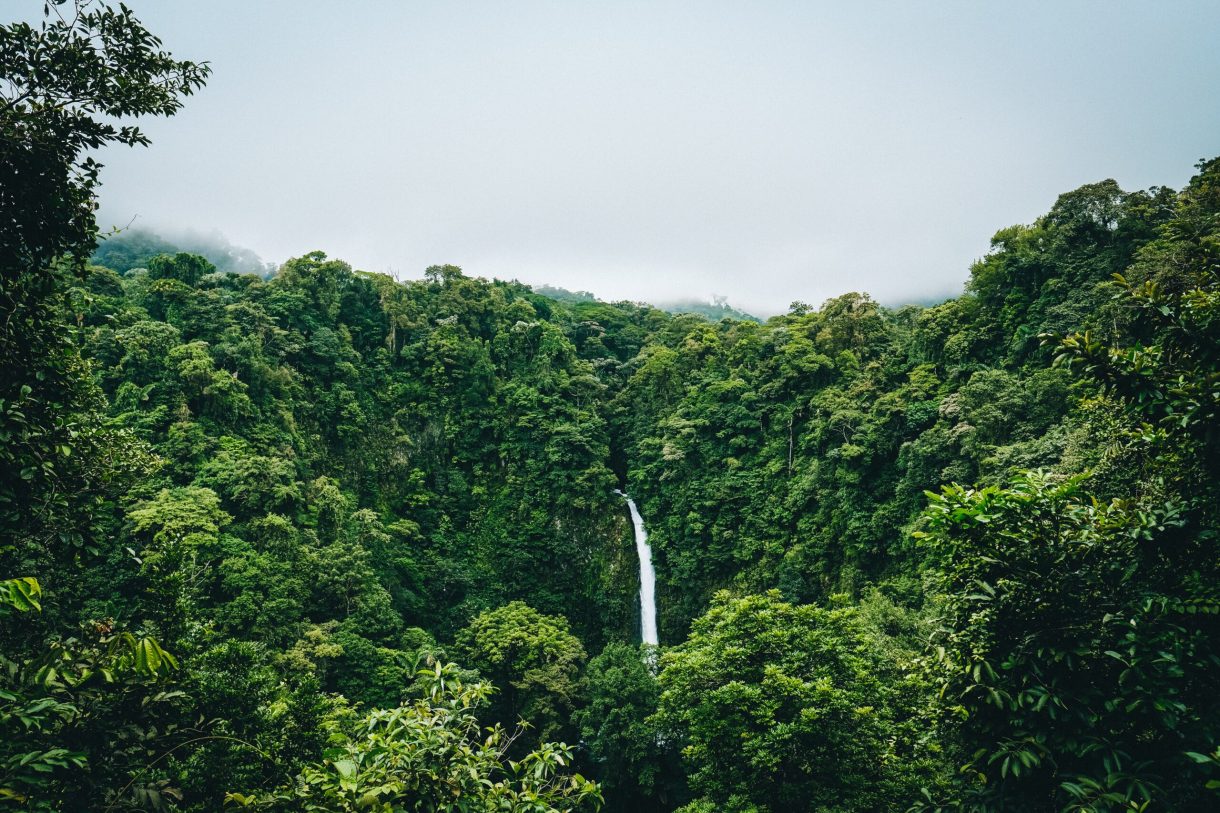
What is Sustainable Travel (and how to travel more sustainably)
Sustainability is a buzzword for travellers yet, for many, the concept remains fuzzy. What is sustainable travel? Why is it important? How can we travel more sustainably? Read on for the answers to all these questions, and more.
Sustainable travel should be the only way we travel. But most of the time, international travel and tourism are far from sustainable. The aviation industry is booming. Cruises are dumping waste into our oceans. Pristine areas of natural beauty are being bulldozed to make way for all-inclusive luxury resorts. And cities around the world are feeling the pressures of overtourism.
Our world only has a finite amount of resources, yet the average human is living like we have the assets of 1.6 Earths to use. There are only so many beautiful, natural, untouched places on our planet and we’re slowly destroying them all. Our overconsumption and unsustainable travel is threatening the existence of these places, which we should be protecting.
Unfortunately, many travellers and travel companies are in denial about how tourism is negatively affecting the environment, local cultures and communities. The word ‘overtourism’ wasn’t even added to the dictionary until 2018. But with climate change a very real threat to the survival of our planet as we know it, this needs to change.
So how do we balance our love for seeing the world with the need to save it? That’s where sustainable travel comes in.
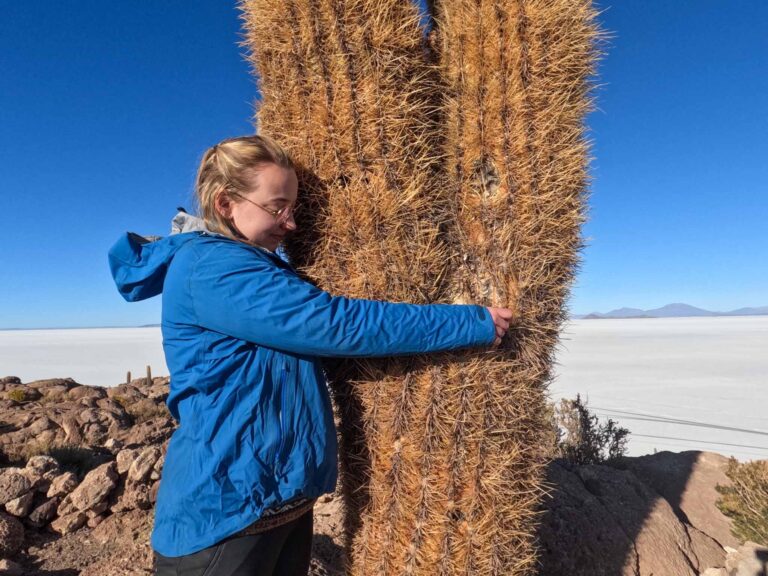
Prickly plants deserve love too! Exploring Bolivia by overland transport as part of a larger South America trip
What is Sustainable Travel?
Sustainable travel means balancing long-term tourism with the preservation of natural and cultural sites. When done correctly, this can minimise the negative impacts of tourism and benefit the community and country in which it takes place.
Although the topic can be overwhelming for beginners, the definition of sustainable travel is really very simple: it means minimizing your negative impact while maximizing your positive impact while travelling.
This form of tourism takes full account of its current and future economic, social and environmental impacts. Sustainable tourism fulfills the needs of the environment, tourists and community whilst maintaining cultural integrity, essential ecological processes and biological diversity.
Essentially, sustainable travel is about valuing our planet and looking after our natural resources. It’s about being aware of the carbon emissions, waste and pollution caused by travel and how that affects the local environment and wildlife. Travellers also need to be conscious of how tourism affects the communities and cultures that we pass through.
Sustainable travel isn’t just one idea. It’s many interconnected ideas. When thinking about how to travel sustainably, we need to consider our impact on the environment, the people we meet, the places we stay and the economies we support.
These concepts come together to form the three pillars of sustainability.
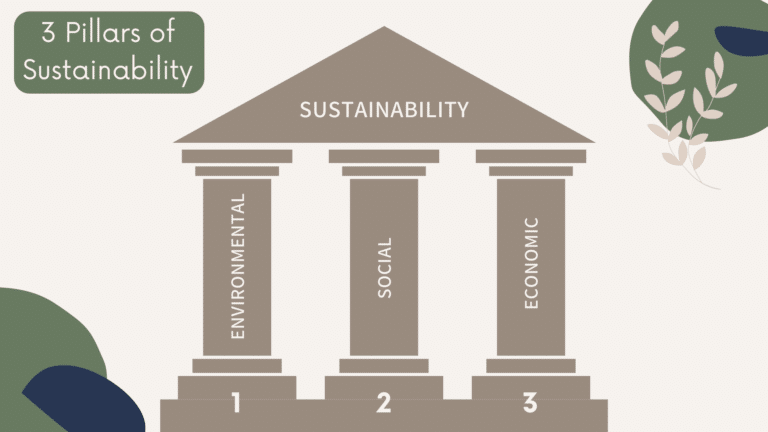
The Three Pillars of Sustainability
The Environmental Pillar
The environmental aspect of sustainability is the one that we think about most. It focuses on reducing our negative impact on the planet and the species we share it with. This means lowering our carbon footprint by choosing greener modes of transport. It may look like cutting down our water usage or reducing our packaging and plastic waste.
As sustainable travellers, we can easily lessen our impact by carrying our own reusable items. When we travel, we can look for accommodation that is climate-positive such as eco-lodges or hotels built from recycled materials. At restaurants, we can eat local produce to reduce food mileage, and cut down on animal products that have a high carbon footprint. Before we travel, we can research wildlife tourism and seek responsible tour operators and activities.
The Social Pillar
The social aspect of sustainability is about our impact on local people and communities. We can increase our positive impact by supporting businesses that are run by and employ local people. It is also important to respect the local culture and customs to avoid causing offence. We should also avoid contributing to anything that encourages exploitation or human rights abuses.
Whether we’re at home or on the go, we can also contribute to NGOs, community tourism projects, social enterprises and charities. This could be a financial contribution or you could look for opportunities to get involved. Responsible travellers should make sure that any voluntary work they carry out is truly beneficial to the community and not just catering to tourists.
The Economic Pillar
The economic pillar is all about how we spend our money on the road. Every penny that we spend is a vote for the sort of world we want to live in. So let’s support local businesses that are transparent about their values.
We can eat at local restaurants, stay in local-owned accommodation and support local tour guides. This ensures that our money is funnelled directly into the local economy instead of lining the pockets of global corporations.

Looking to experience culture? I can guarantee there’ll be a hidden gem that won’t contribute to overtourism!
23 Ways to Travel More Sustainably
As travellers and tourists, we need to take responsibility for the damage we are causing to the planet. We need to travel more sustainably and advocate for others to do the same. For most of us, this is a learning curve. It isn’t going to happen overnight. But we can slowly work towards better, more sustainable travel by implementing small changes into our travel routines.
Here are some tips for ways we can be more sustainable travellers:
Transport
1. Consider the most sustainable way to get to your destination
Depending on where you’re going, there can be multiple ways to get to your destination. Consider taking a bus or train to lower your carbon footprint. Perhaps try hitching (if it’s safe to do so) or car sharing. If you’re travelling long distances alone, flying might even be the most eco-friendly option.
2. If you have to fly, fly direct
Most of the carbon emissions from flying are released during take-off and landing so it’s best to fly direct when possible. Be creative! Maybe you could take a direct flight to a country’s international airport and travel overland to your final destination?
3. Choose economy class
Choosing economy class on any form of transportation is one of the easiest ways to minimise your impact on the planet and your wallet. Yes, it might be marginally less comfortable. But by choosing an economy seat you can take up five times less space than business class.
4. Use sustainable transport once you arrive
Once you arrive at your destination make sure you walk or cycle where possible. Try to limit your in-country or in-continent flights. Why not live like a local and embrace the ups and downs of the local public transport system when you want to explore further afield. Trains are a relaxing way to get from A to B, and you get to see lots of the countryside too.
5. Become a slow traveller
Slow travel is a mindful way of experiencing a destination that can lower your carbon emissions and help to combat the impacts of overtourism. Minimise the negative effects of your trip by embracing slow travel.
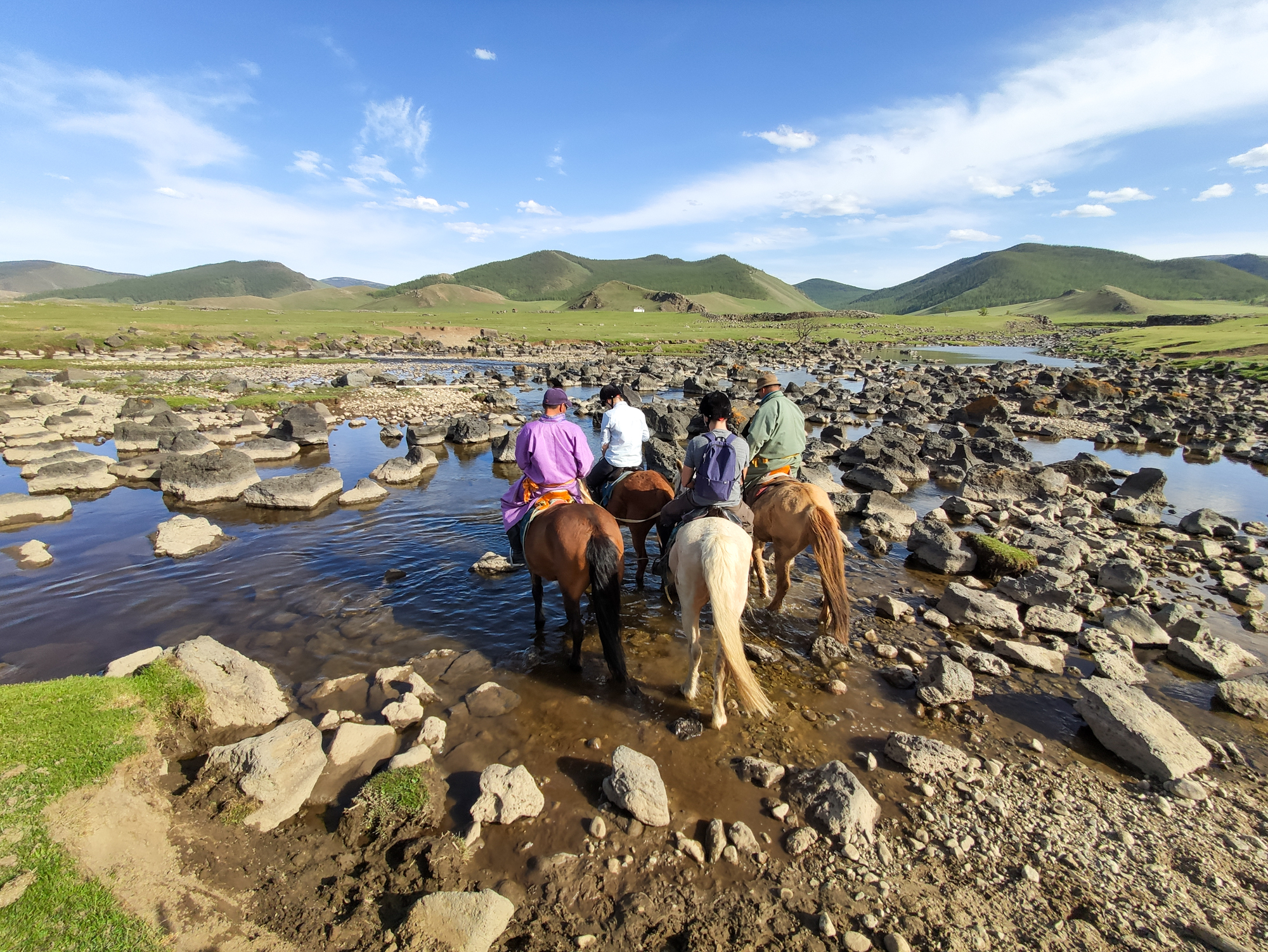
Travel how the locals do, whether that’s train, bus, bicycle or horse…
Accommodation
6. Stay in locally-owned accommodation
Support the livelihood and economy of the locals by staying in locally-owned accommodation. Between hostels, hotels, bed and breakfasts, AirBnBs and glamping/camping sites, there’s an option for every type of traveller.
7. Avoid large resorts & all-inclusives
Large resorts are terrible for the environment. Washing towels and changing bedsheets daily aren’t necessary and waste energy and water. Those little travel toiletries are cute but unnecessary plastic waste. And many resorts also destroy natural areas to build luxury accommodation and pools. Plus, the money from these tends to line the pockets of wealthy foreign investors.
All-inclusives are also unsustainable. Tourists that pay upfront for their accommodation, food and activities have no motive to leave their resort. This means that they don’t contribute to local businesses, hire local guides or experience the local culture. Not only is this unsustainable for the community, it will also give you a less exciting experience.
8. Cut down on your cruises
A cruel combination of large resort and all inclusive, cruises are the antithesis of sustainable travel. Your carbon footprint triples in size when taking a cruise. If cruise ships were a country, they would be the earth’s seventh biggest polluter. And cruise emissions contribute to serious health and environmental issues. Cruises are one of the least environmentally-friendly accommodation and transport options around. They also cause a lot of issues for the communities at the cities they dock at.
9. Check how sustainable your accommodation is
Why not stay in an ‘eco hotels’ which are designed and built sustainably. These are more likely to be committed to reducing waste, and using renewable energy. Eco-hotels often have the community at the centre of their business and will employ local people and sources labour locally. They often promote ethical and ‘alternative’ tours and can be a great hub to discover things to do in a new place, or even team up with like-minded tourists.
One of my favourite eco-accommodations was a hostel in the Nepalese jungle. Evergreen Eco Lodge was built from sustainable materials, used solar electricity, had rainwater showers, composting toilets and encouraged guests to enjoy local, plant-based food. They partnered with reputable local guides and advocated for ethical elephant activities.
10. Go wild camping!
Camping is the ultimate sustainable travel accommodation, and it can be extremely budget friendly. Many countries don’t care where you pitch your tent as long as you aren’t causing any bother. Just remember to follow the code for the responsible enjoyment of the outdoors, which boils down to leaving nature how you found it and taking your trash home.
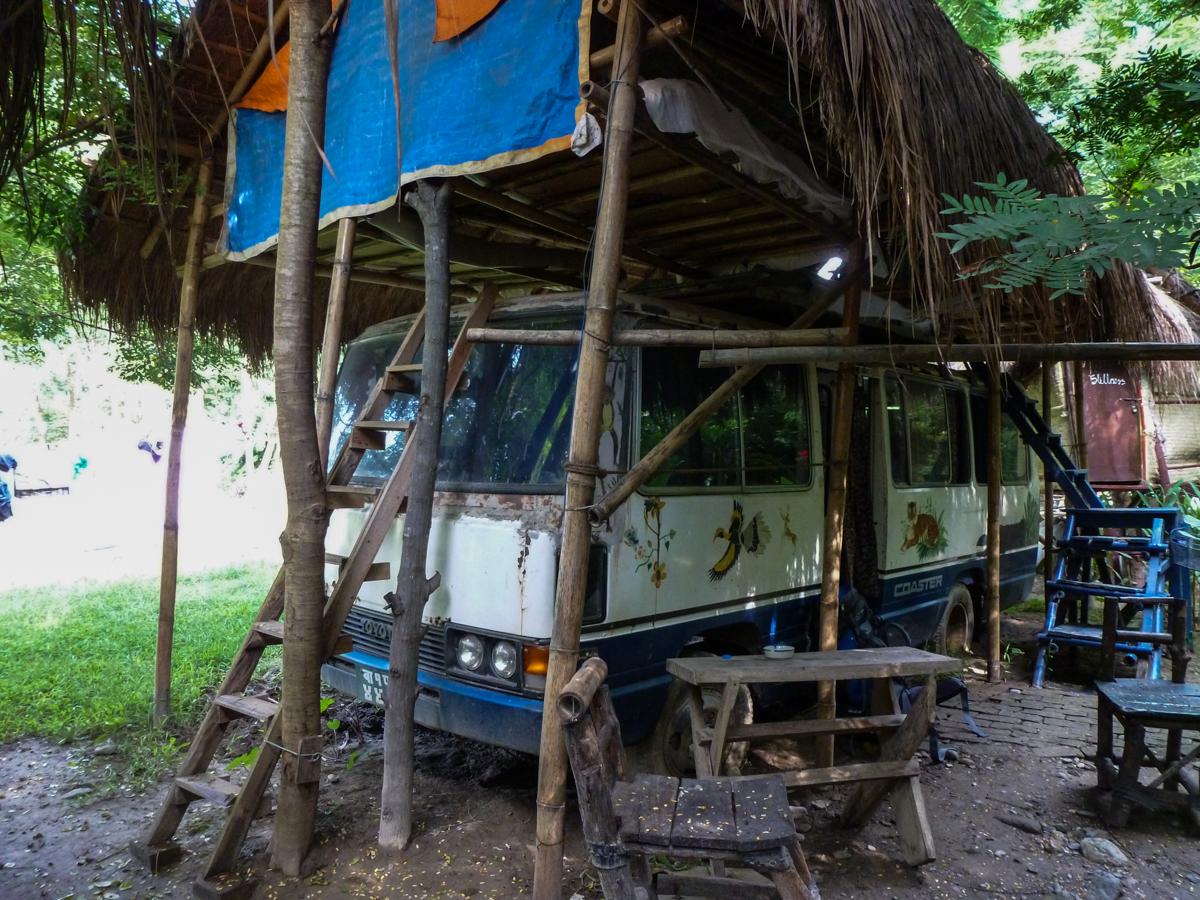
Sleeping in an upcycled bus in an eco-lodge in Nepal was a unique experience.
Activities
11. Do your research & choose sustainable activities
Read around any activities that you want to do and choose a tour operator that’s passionate about protecting and preserving their destination. Look for accreditations such as GSTC, Green Globe, Rainforest Alliance, EarthCheck, Green Tourism Business Scheme (UK) and other regulatory bodies.
Watch out for greenwashing – when companies make claims to give the impression that they are more sustainable than they actually are. If you’re unsure about an operator’s policies, get in touch with them via email or social media.
12. Only participate in responsible and ethical wildlife tourism
That wildlife park or elephant sanctuary might not be as ethical as you think. Do your research and avoid attractions that advertise close encounters with animals. Riding a wild animal should be avoided at all costs. And if you’re allowed to bathe, cuddle or pet a wild animal this is usually a bad sign too.
Instead, opt for tours and attractions that allow you to observe the animal in its natural habitat at a safe and respectful distance, You could try a boat, foot or jeep safari instead of experiencing the jungle atop an elephant. Or perhaps find an ethical sanctuary or ‘elephant happy hour‘ with a focus on observation over interaction
13. Volunteer with NGOs and community projects
Volunteering when you travel can be a really rewarding experience. But it can also be extremely damaging. We’ve written a whole post on the pros and cons of voluntourism, you can check it out here.
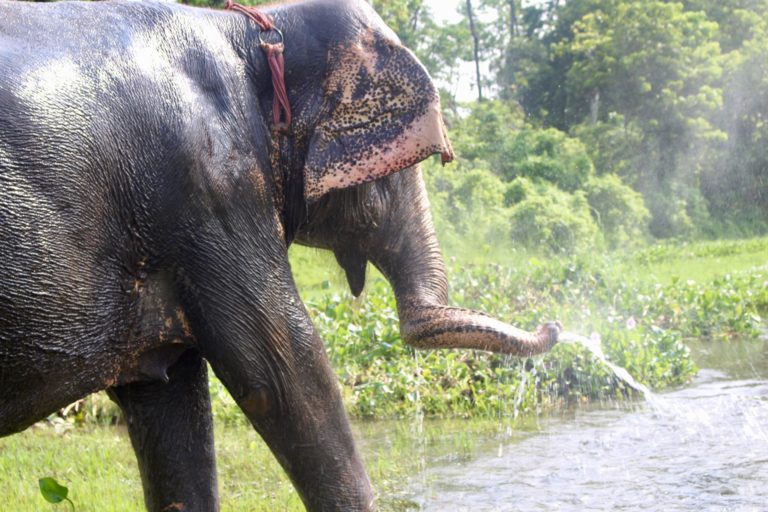
Animal encounters can be incredible, but opt for a hands-off approach
Eating Out
14. Eat in restaurants and cafes owned by locals
Follow the locals. A restaurant full of locals is likely to be a delicious and great value place to grab a bite. Pay attention to where, what and when locals eat and you’ll be on your way to successful, delicious meals that serve as cultural experiences as well as fuel for your body. And the money you spend will go straight into the local economy!
15. Embrace street food
No matter where in the world you find yourself, street food is a delicious, cheap option. Embrace it, don’t avoid it. If you want to minimise your chances of a tummy upset, pay attention to the queues at stalls and consider going vegetarian.
16. Buy local food and shop in local markets
Eat locally grown food from local producers. Avoid imported foods and international food chains which have a high environmental footprint. Farmers markets can be a great place to pick up healthy food for a cheap price which you can snack on during the day or use to cook a delicious meal back at your hostel
17. Check out apps to reduce food waste
As a planet, we waste 3.5 million tonnes of food every single day. That’s over 3,000,000,000 kilograms daily. The weight of almost 32’000 blue whales, the largest animal on our planet. One third of all food produced is wasted whilst people starve globally. If you’re exploring a city, chances are they’ll have some sort of food-saving programme. Not only does this minimise food waste, but you can eat delicious local produce for a ridiculously low price.
18. Avoid animal products
Cutting down on animal products is one of the biggest things you can do to reduce your carbon footprint. Because they use more land and water, animal products – and beef in particular – have an outsized impact on the planet.
The meat industry is a huge contributor to climate change and forest destruction. Ranchers attempting to clear swathes of the Amazon forest for cattle grazing lead to devastating wildfires. Meat provides just 18% of the world’s consumed calories but uses a whopping 83% of agricultural land. And 70% of soy grown worldwide is used to feed animals whilst humans around the world go hungry. I’m not pushing you to go vegan overnight, but our collective impact of cutting back on animal products would be astounding.
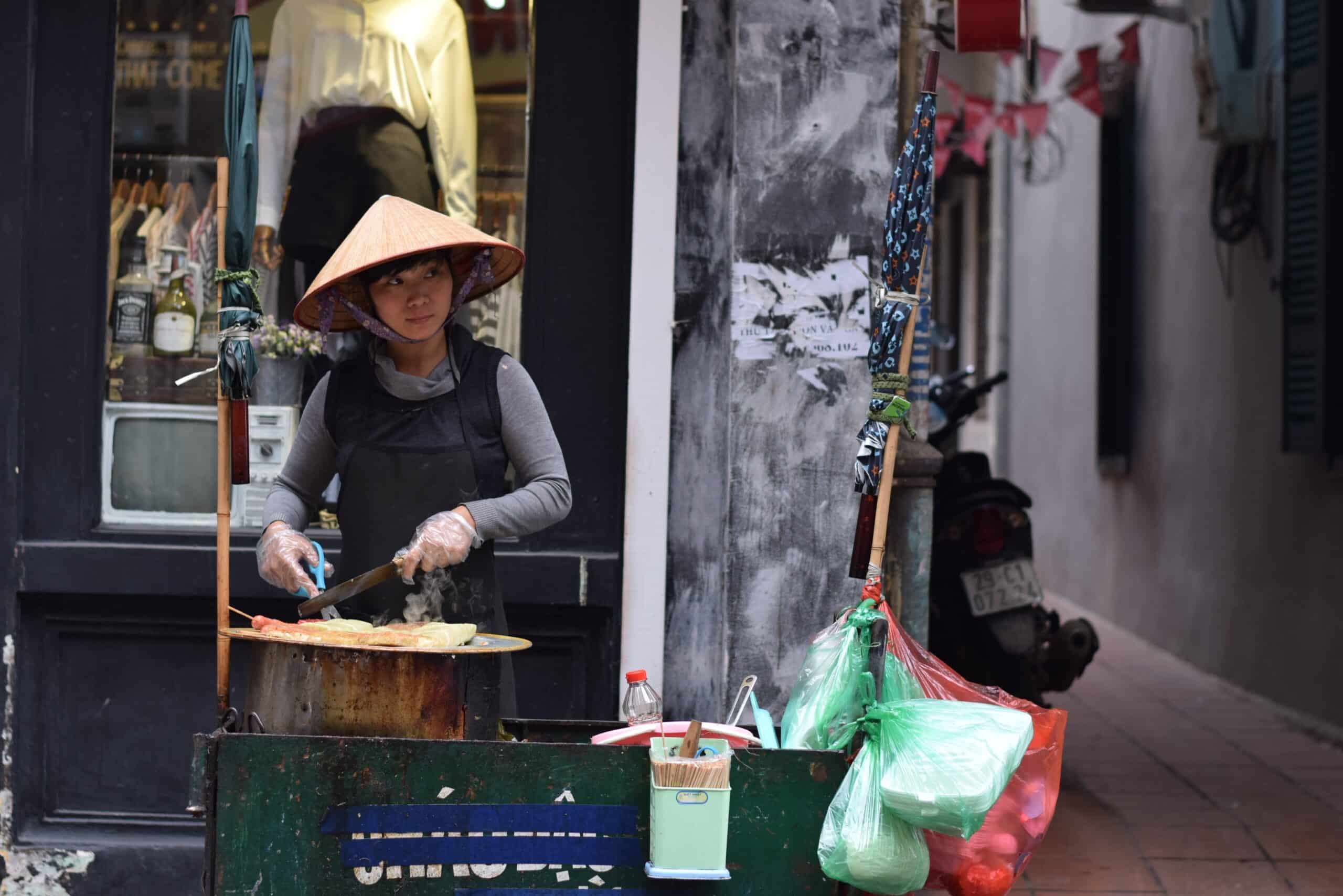
The street markets of Vietnam are a great place to try local food and pick up souvenirs
Shopping
19. Buy gifts and souvenirs made by local artists
Travel is a luxury and those who can afford to see the world have a duty to improve the lives of the people they meet. Buying souvenirs from local craftspeople provides an income and livelihood and encourages continuation of these (often) culturally important skills and handiwork.
20. Avoid fur, feathers and ivory
Avoid any souvenirs that have been made out of animal products such as fur, bones or feathers. Demand for these products can encourage poaching, wildlife trafficking and affect the survival of endangered species and could be contributing to illegal wildlife trade.
Packing
21. Pack light
I am a huge advocate for packing less. Not only does it cut down your emissions (increased weight = increased fuel used to carry it) but packing light gives you more energy to explore. it gives you the freedom to dictate your own adventures, not be dictated by the weight of your backpack.
Packing mindfully can also help to lower your consumption. You probably don’t need new dresses for every holiday, or a new swimsuit every season. I like to wear and repair my gear until it’s worn out.
22. Remember your eco-essentials
Every reusable replacement that we pack helps us to limit the single-use plastic that ends up in our oceans. Remember your reusable water bottle, food container, coffee cup, cutlery and tote bag to minimise the plastic you use on the go. Need some ideas? Check out these.
Activism
23. Shout about sustainable travel
Be an advocate for sustainable travel. Companies know that they need to change, but are worried about going against the grain. Have conversations, speak up and let businesses know that you’re interested in sustainable alternatives.
When you return from your adventures, spread the word! Talk about the ecolodges you stayed at. Share the responsible tours you joined. Shout about the ethical animal attractions you experienced. Highlight the importance of sustainable travel to your friends, family, colleagues, social media and blogs. The more people hear about it, the more demand it’ll receive and the more we can change the world.
Disclaimer: The information and advice provided in this blog are the author’s opinions and based on their personal experiences. All information was accurate at the time of writing. However, things can change quickly, so always double-check current conditions and guidelines before setting out. Remember, your travels and safety are your own responsibility, and this blog can not be held responsible for anything that might happen on your adventures! Always exercise caution and good judgment. Oh, and don’t forget to get travel insurance! Happy travels!
This post may contain affiliate links (yay for transparency!) This means that I will earn a small commission, at no additional cost to you, if you click the link and choose to buy the product. I only link to stuff I have personally bought and found useful and never endorse crap. Your support helps keep the site going, thank you!
Alice
Alice is a UK travel blogger who advocates sustainable travel and being more eco-conscious on a budget. She loves coffee, her houseplants and summiting mountains.
You May Also Like
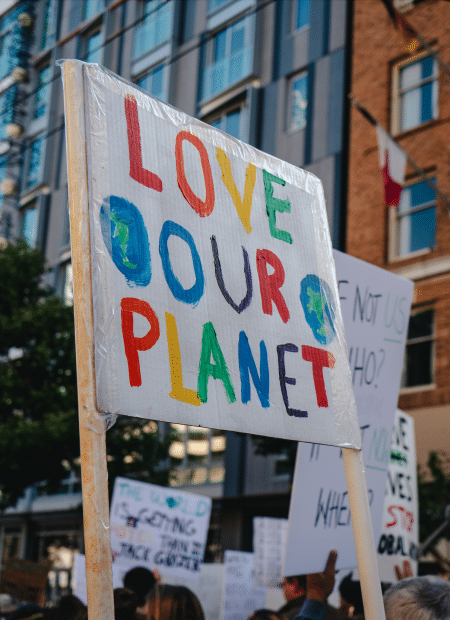
Carbon Offsetting: Is it enough?
August 21, 2021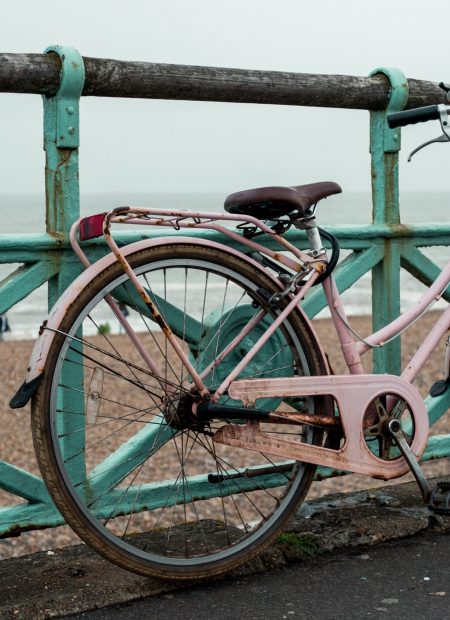
Incorporating sustainable travel in a post-Covid world
October 3, 2020
2 Comments
Sarah
This is a great article! I had no idea flying on direct flights were so much better!! Definitely worth the extra money for a nonstop flight 🙂
Alice
Yes and much nicer to be in the air for less time too 🙂